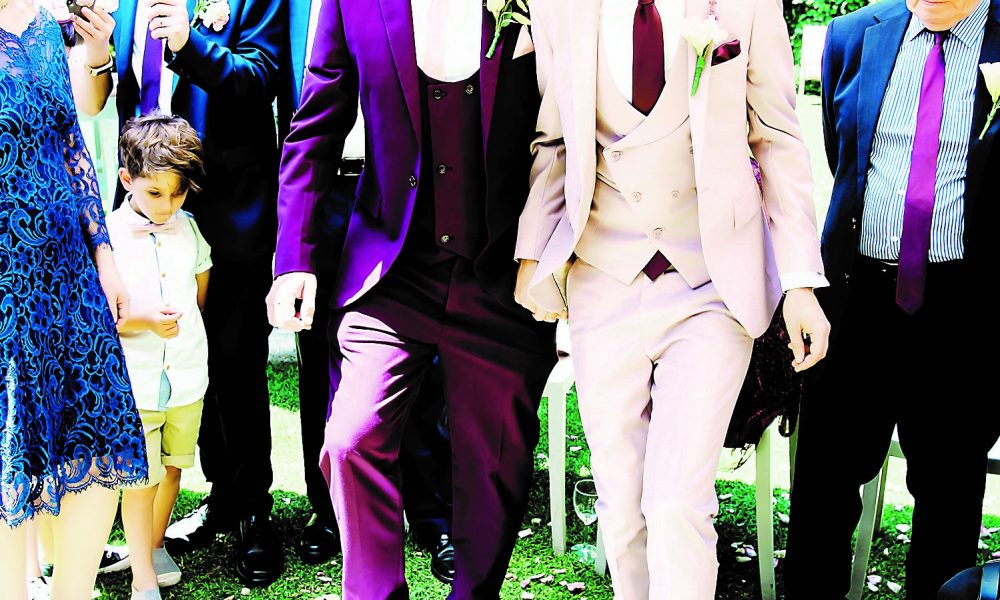Voices
Gay, equal – and married
When a child is born in the Jewish tradition, their parents bless them that one day, they will get married. For same-sex couples, that aspiration hasn’t been a possibility until recently.

DAVID BILCHITZ AND RUVI ZIEGLER
While we hope that holding a same-sex wedding will be commonplace in the future, we recognise that for many people across this continent and within the Jewish community, it remains unattainable. In this light, we are grateful for the public affirmation of our love that we received from close family, friends, and colleagues, who fully embraced the joy of our marriage.
Our story feels like it has an element of beshert (the preordained) in it. A chance meeting in a hotel lobby in Seoul, South Korea, prior to the World Congress of Constitutional Law, brought us, two legal academics (one South African, the other British-Israeli) together. Since then, our journey has crossed continents and countries, oceans, and mountainways, and straddled the boundaries of time and place.
It has taken us on trains, planes, cable-cars, boats, and many a stroll through the countryside and cityscapes. At times, we were physically apart but remained emotionally connected. Technology, sensitivity, and common purpose always brought us closer. We are both rooted in our communities in Johannesburg and Oxford, and yet share the enchantment of connections, cultures, and cuisines, reaching beyond the limits of territorial boundaries. Our values extend beyond us, from deep distress at social injustice, to an active commitment to advancing the flourishing of every sentient being.
Last year, while we were both conducting research in Berlin, at twilight, as the summer sun dipped behind the verdant forest, on the cusp of the shore of the Krumme Lanke waters, we expressed our love and desire to tie our fate through the sacred commitment of marriage. In a city where our Jewish and gay identities would have twice condemned us in the past, we proudly chose to be fully present and reclaim lost spaces for affirmation and celebration.
After months of careful planning, fine-tuning our dancing, and colour-coordinating our attire, our marriage day finally arrived on 16 February 2020. We spent many hours reflecting on what a fully egalitarian, same-sex, religious Jewish wedding looks like.
We chose our chuppah to be led by a stellar team of the best and brightest female and male religious leaders of the South African Jewish community. Drawing on the thinking of a feminist scholar, Professor Rachel Adler, we enacted a different legal form to the traditional notion of acquisition in Jewish marriage law, with its inegalitarian dimensions. Instead, we formed a brit shutafut, or partnership – a form of relationship in traditional Jewish law that represents a joining of equals. As a signal, we placed our rings in a tallit bag which was held up for the congregation to witness the pooling of our resources in partnership. Our ketubah (Jewish marriage contract) in Hebrew and English, also expressly egalitarianism, representing our commitment to each other and the betterment of the world – tikkun olam. Our ceremony ended with us both breaking glasses in the hope of recognising and repairing the brokenness that many LGBTQ (lesbian, gay, bisexual, and transgender) people (and others) still face.
Our ceremony was followed by energetic and joyous communal Jewish dancing which made our spirits soar, as did the masterfully created wedding cake (by Impressionist Cakes). We chose to have a vegan wedding, as we didn’t want any animals to be harmed for our celebration. We are overwhelmed by the outpouring of affection that we have been receiving from across the Jewish and wider South African communities, and across the world.
We know there are members of the Jewish community and beyond who would not have their families celebrate with them, and who still experience shame about their sexuality. It need not be like that. There are positive stories like ours – of wonderful families, friends, and colleagues, including those self-identifying as religiously observant – who embrace and celebrate their gay, lesbian, bi or trans children. Events like Cape Town Pride, which takes place this week, are designed to affirm that love is beautiful in all its diverse forms.
We have been lifted on eagle’s wings into married life, and are feeling elation, gratitude, and a genuine sense of wholeness.
- David Bilchitz is a professor at the University of Johannesburg; Ruvi Ziegler is an associate professor at the University of Reading (UK). They will present a session at Limmud, Johannesburg in August 2020 about constructing a same-sex, Jewish religious ceremony.
Marion Joseph
February 27, 2020 at 1:27 pm
‘Mazal tov David and Ruvi. A true match made in heaven. Hopefully you will inspire others to have the courage to follow in your footsteps.’